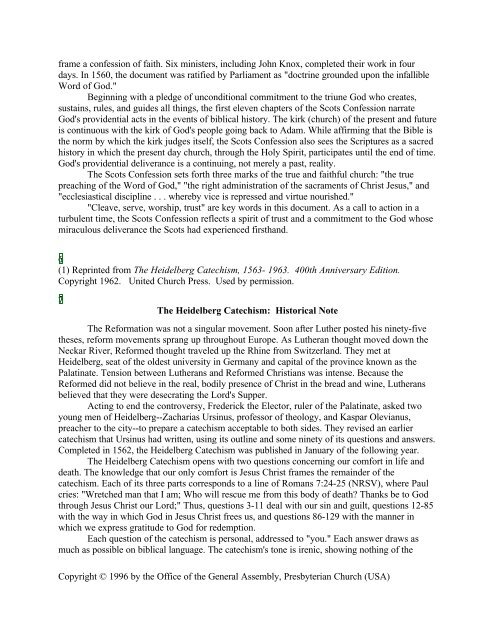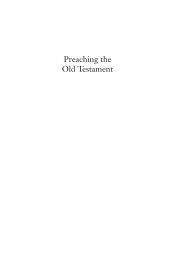The Book of Confessions - The Presbyterian Leader
The Book of Confessions - The Presbyterian Leader
The Book of Confessions - The Presbyterian Leader
Create successful ePaper yourself
Turn your PDF publications into a flip-book with our unique Google optimized e-Paper software.
frame a confession <strong>of</strong> faith. Six ministers, including John Knox, completed their work in four<br />
days. In 1560, the document was ratified by Parliament as "doctrine grounded upon the infallible<br />
Word <strong>of</strong> God."<br />
Beginning with a pledge <strong>of</strong> unconditional commitment to the triune God who creates,<br />
sustains, rules, and guides all things, the first eleven chapters <strong>of</strong> the Scots Confession narrate<br />
God's providential acts in the events <strong>of</strong> biblical history. <strong>The</strong> kirk (church) <strong>of</strong> the present and future<br />
is continuous with the kirk <strong>of</strong> God's people going back to Adam. While affirming that the Bible is<br />
the norm by which the kirk judges itself, the Scots Confession also sees the Scriptures as a sacred<br />
history in which the present day church, through the Holy Spirit, participates until the end <strong>of</strong> time.<br />
God's providential deliverance is a continuing, not merely a past, reality.<br />
<strong>The</strong> Scots Confession sets forth three marks <strong>of</strong> the true and faithful church: "the true<br />
preaching <strong>of</strong> the Word <strong>of</strong> God," "the right administration <strong>of</strong> the sacraments <strong>of</strong> Christ Jesus," and<br />
"ecclesiastical discipline . . . whereby vice is repressed and virtue nourished."<br />
"Cleave, serve, worship, trust" are key words in this document. As a call to action in a<br />
turbulent time, the Scots Confession reflects a spirit <strong>of</strong> trust and a commitment to the God whose<br />
miraculous deliverance the Scots had experienced firsthand.<br />
6<br />
(1) Reprinted from <strong>The</strong> Heidelberg Catechism, 1563- 1963. 400th Anniversary Edition.<br />
Copyright 1962. United Church Press. Used by permission.<br />
7<br />
<strong>The</strong> Heidelberg Catechism: Historical Note<br />
<strong>The</strong> Reformation was not a singular movement. Soon after Luther posted his ninety-five<br />
theses, reform movements sprang up throughout Europe. As Lutheran thought moved down the<br />
Neckar River, Reformed thought traveled up the Rhine from Switzerland. <strong>The</strong>y met at<br />
Heidelberg, seat <strong>of</strong> the oldest university in Germany and capital <strong>of</strong> the province known as the<br />
Palatinate. Tension between Lutherans and Reformed Christians was intense. Because the<br />
Reformed did not believe in the real, bodily presence <strong>of</strong> Christ in the bread and wine, Lutherans<br />
believed that they were desecrating the Lord's Supper.<br />
Acting to end the controversy, Frederick the Elector, ruler <strong>of</strong> the Palatinate, asked two<br />
young men <strong>of</strong> Heidelberg--Zacharias Ursinus, pr<strong>of</strong>essor <strong>of</strong> theology, and Kaspar Olevianus,<br />
preacher to the city--to prepare a catechism acceptable to both sides. <strong>The</strong>y revised an earlier<br />
catechism that Ursinus had written, using its outline and some ninety <strong>of</strong> its questions and answers.<br />
Completed in 1562, the Heidelberg Catechism was published in January <strong>of</strong> the following year.<br />
<strong>The</strong> Heidelberg Catechism opens with two questions concerning our comfort in life and<br />
death. <strong>The</strong> knowledge that our only comfort is Jesus Christ frames the remainder <strong>of</strong> the<br />
catechism. Each <strong>of</strong> its three parts corresponds to a line <strong>of</strong> Romans 7:24-25 (NRSV), where Paul<br />
cries: "Wretched man that I am; Who will rescue me from this body <strong>of</strong> death? Thanks be to God<br />
through Jesus Christ our Lord;" Thus, questions 3-11 deal with our sin and guilt, questions 12-85<br />
with the way in which God in Jesus Christ frees us, and questions 86-129 with the manner in<br />
which we express gratitude to God for redemption.<br />
Each question <strong>of</strong> the catechism is personal, addressed to "you." Each answer draws as<br />
much as possible on biblical language. <strong>The</strong> catechism's tone is irenic, showing nothing <strong>of</strong> the<br />
Copyright © 1996 by the Office <strong>of</strong> the General Assembly, <strong>Presbyterian</strong> Church (USA)




